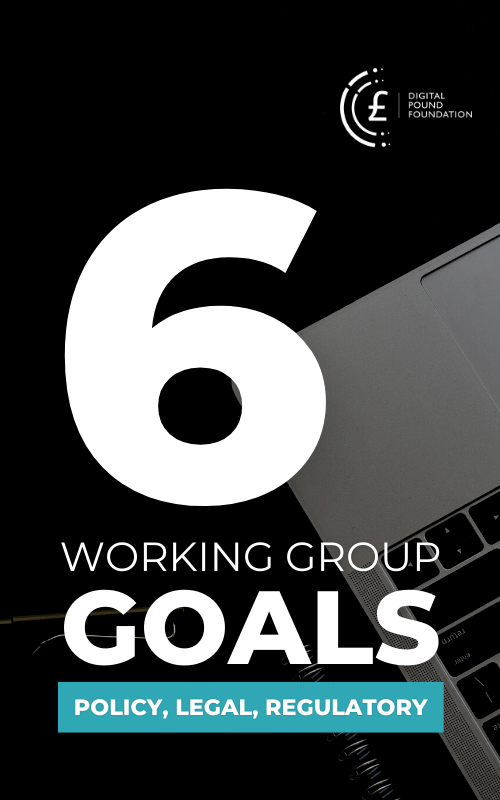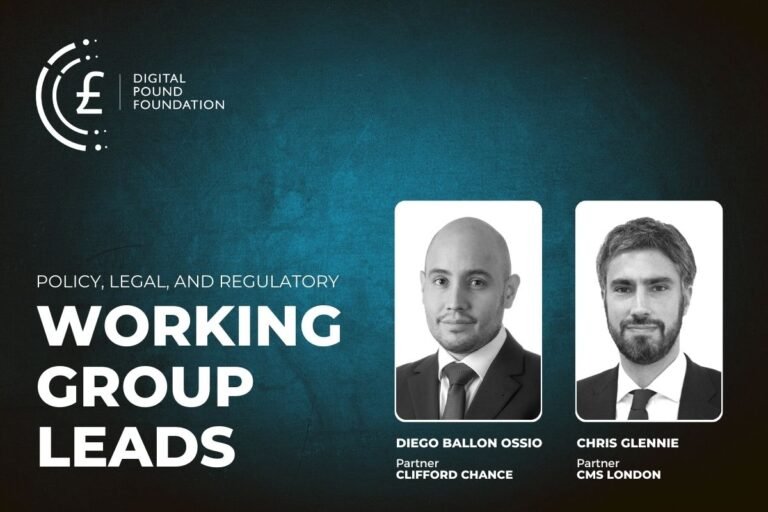The goal of the Digital Pound Foundation’s Policy, Legal and Regulatory Working Group is to identify, define and articulate key risks, challenges and benefits arising from the introduction of new forms of digital money, including central bank digital currencies (CBDC), stablecoins, and e-money tokens, and to communicate these effectively to policymakers, regulators, financial markets participants, consumer and industry groups and other participants and stakeholders in the emerging ecosystem of new forms of digital money. It provides a forum where our members can communicate, collaborate and share ideas and practical solutions – from a policy, legal and regulatory perspective – towards a healthy and diverse ecosystem for new forms of digital money, whilst showcasing their skills and abilities within the sector.

- Identify, define and articulate the DPF’s policy agenda, key policy positions and recommendations.
- Identify, define and articulate the legal and regulatory challenges arising with respect to the introduction of a Digital Pound and an ecosystem for new forms of digital money.
- Identify, define and articulate the DPF’s proposed approaches and solutions to the legal and regulatory challenges identified above.
- Engage with relevant policymakers, regulatory bodies and other forums to communicate and advocate for the DPF’s policy positions.
- Develop working relationships and collaborate with other industry associations, trade bodies and organisations having similar goals and views.
- Respond to legal, regulatory and policy-related outreaches, such as consultations, discussion papers, and calls for evidence.
Group Co-Leads
Leading our Policy, Legal, and Regulatory Working Group are Diego Ballon Ossio, Senior Associate at Clifford Chance, and Chris Glennie, partner in the Financial Services Regulatory Practice at CMS London. Diego specialises in advising financial institutions and other market participants on financial market regulation and activities related to benchmarks, financial services trading and conduct requirements as well as payment services and fintech. Meanwhile, Chris has significant payments, fintech and financial regulation expertise. He has a unique background and insight having joined CMS from the Bank of England where he was working on a number of high profile projects such as the renewal of the Bank’s Real Time Gross Settlement System (RTGS), the broadening of access to RTGS and the payments systems which settle over it to non-bank payment service providers or central bank digital currency (CBDC) / stablecoin workstreams.

All Digital Pound Foundation members have the opportunity to get involved in the creation of educational materials, thought leadership and resources, as well as an engaging programme of communications, publications and events, that will not only support the wider understanding of new forms of digital money, but help to showcase their knowledge and expertise. Simply head over to our membership page where you can find information about our various membership options.
We are now offering a discounted ‘Single Working Group Membership Package’, providing access to a choice of two of our Working Groups: Digital Sustainable Finance Working Group or Privacy and Identity Working Group.
In addition to joining one of these Working Groups, you will also benefit from:
- Free attendance to all our in-person and online events, with the possibility of speaking opportunities where they relate to your Working Group activity
- Participation in our Roundtables where organised by the Working Group you’re a member of
- Access to our members-only WhatsApp group
- An announcement of your membership via our website, newsletter, and social media channels
- Addition of your logo and backlink to our website, placed among our other members
You can choose to upgrade your membership at any stage should you wish to gain access to all our Working Groups, in addition to the other full membership benefits. For more information, please visit our membership page using the button below.


















































